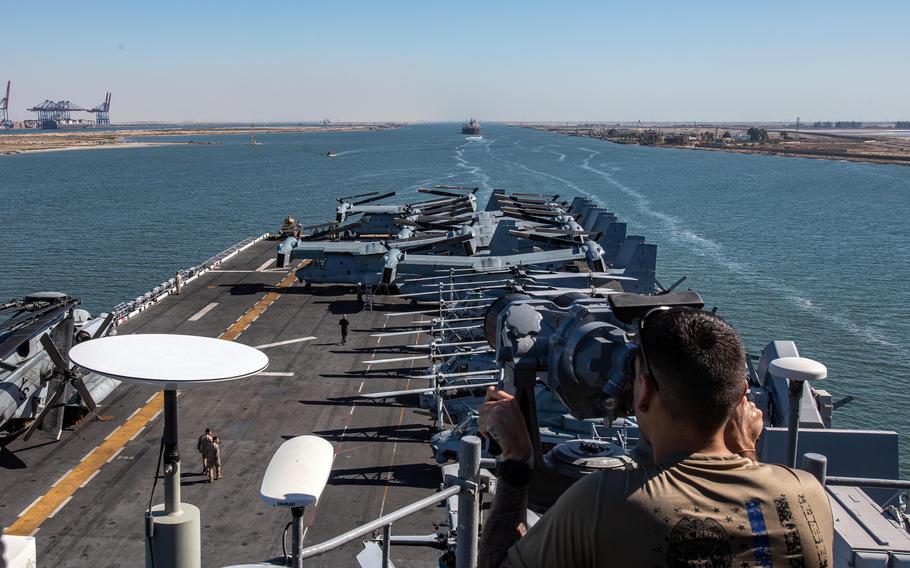
A Navy sailor stands watch on the USS Bataan as it transits the Suez Canal with the 26th Marine Expeditionary Unit on Aug. 6, 2023. Components of the Bataan Amphibious Ready Group and the Marine unit are deployed to the U.S. 5th Fleet area of operations to help ensure maritime security in the Middle East. (Nayelly Nieves-Nieves/U.S. Marine Corps)
Even as the Biden administration seeks to deescalate tensions with Iran through a prisoner exchange, the U.S. is debating a plan that would put armed U.S. sailors and Marines aboard civilian vessels transiting the Strait of Hormuz, the strategic Middle East waterway where approximately a fifth of the world’s sea-born crude oil passes. The idea, which aims to deter Tehran from harassing or capturing the vessels, has reportedly received support from senior U.S. policymakers. While President Joe Biden has yet to sign off, the decision “has pretty much been made,” according to an unnamed U.S. official.
Details of the proposal are still in flux but, based on public reporting, the U.S. is looking to offer vulnerable ships what would effectively be an armed guard staffed and paid for courtesy of the U.S. military. Unfortunately, it would also be another step up the escalation ladder in the Middle East at a time when the administration is purportedly interested in right-sizing its regional presence in favor of the Indo-Pacific.
Iran’s tendency to complicate international shipping in the Persian Gulf is well-known. In June 2019, two tankers were struck by limpet mines in an attack U.S. officials blamed on Tehran. Last November, an Iranian drone struck an Israeli-owned oil tanker off the coast of Oman. By the U.S. Navy’s count, the Iranians have harassed, attacked or seized nearly 20 merchant ships since 2021, including two incidents in July when Iranian navy vessels attempted to seize two oil tankers in international waters. In those instances, the destroyer USS McFaul warded off the Iranians.
The Biden administration has spent months enhancing military patrols in the Persian Gulf in the hope that Tehran would be discouraged from continuing its destabilizing behavior. On July 26, the Pentagon deployed a squadron of F-35 joint strike fighters to the region, which supplemented the A-10 and F-16 aircraft sent in the spring. And on Aug. 6, more than 3,000 U.S. sailors and Marines aboard two U.S. Navy ships arrived in the Middle East.
Tasking U.S. Marines to serve as de facto security guards for private ships, however, is a different prospect than sending a few big-ticket weapons systems into the Middle East to make a statement or improve your surveillance capabilities. The latter is a questionable policy but comes with built-in procedures for conflict management and escalation control; the former is a scheme the U.S. hasn’t implemented since World War II and makes the prospect of a full-blown war between Washington and Tehran more realistic.
In essence, the U.S. is hoping that escalating the situation in the Persian Gulf will, over time, compel Iran to deescalate for fear of getting into a direct confrontation with the world’s most formidable power. But hope is not a viable basis for policy, particularly when the consequences of being wrong could include a conflict nobody wants.
It’s not hard to envision how the administration’s pending plan could go disastrously wrong. The questions are numerous. Would the Iranians know ahead of time which private vessels carried U.S. military personnel? If the Iranians attempted to sink or board a vessel carrying U.S. Marines or sailors, at what point would they engage the Iranians militarily in self defense? If an incident occurred, do the U.S. and Iran have the communication channels already set up to establish dialogue and avert an even deeper cycle of escalation? If not, how would the U.S. and Iranian militaries deescalate and deconflict in the heat of the moment? For instance, would the two countries have to rely on third-party mediation or go through their respective ambassadors at the United Nations? All of this deserves serious consideration from U.S. policymakers before the plan is adopted.
One must also understand why Iran is harassing vessels in the first place. Taken in isolation, these actions are against international law and a modern-day form of piracy, with Tehran arbitrarily stopping tankers in their tracks, detaining the crew and taking control of the cargo.
Context, however, is important. The Iranians, with the Islamic Revolutionary Guard Corps-Navy often in the lead, sees the seizure of civilian vessels in the Persian Gulf as a legitimate and proportionate response to what they themselves view as extraterritorial enforcement actions by Washington against the Iranian oil industry. There are numerous cases of the U.S. seizing Iranian cargo; in August 2020, the U.S. confiscated four ships carrying Iranian crude oil bound for Venezuela. In May 2022, the U.S. impounded a Russian ship near Greece that had Iranian crude aboard. And this April, the U.S. Justice Department ordered a tanker of Iranian crude heading toward China to redirect toward the U.S.
While none of this excuses Iran's conduct on the high seas, it at least helps explain why Tehran acts the way it does. With this in mind, it’s hard to envision how several thousand U.S. troops spread across multiple vessels transiting the Gulf is going to solve the problem. More likely, new ones will be created.
If the U.S. wants less Iranian bellicosity in the Persian Gulf, it will have to play the long game instead of taking shortcuts. This will require addressing one of the reasons why U.S.-Iran relations remain in such an adversarial state: the continued absence of an agreement that trades U.S. sanctions relief on the Iranian oil and banking sectors in exchange for verifiable limitations on Tehran’s nuclear program.
Until that time comes, we can expect more standoffs in the waters of the Middle East. In the meantime, the best the U.S. can do is avoid making the situation worse.
Daniel R. DePetris is a fellow at Defense Priorities and a syndicated foreign affairs columnist at the Chicago Tribune.